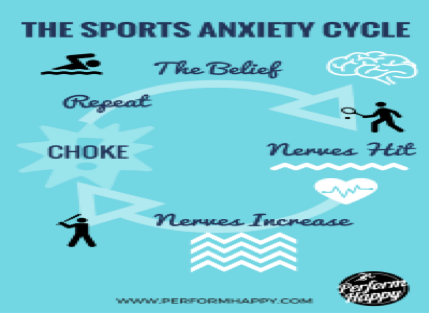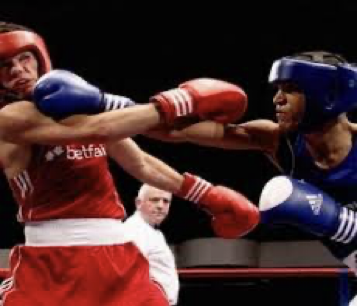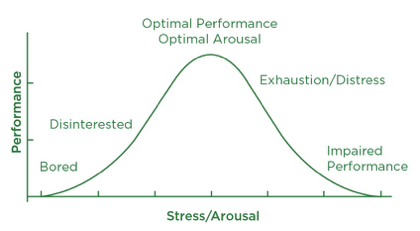Share the love
BE SO CONFIDENT AND FOCUSED IN YOUR PERFORMANCE THAT YOU PROCESS COMPETITION AROUSAL AS AN EXCITEMENT RATHER THAN ANXIETY

Anxiety before an event is a common phenomenon and 40 to 55% of the Combat sports athletes experience it .
Science defines it as a negative emotional response to competition stressors exhibited prior to and during athletic performance.
In simple terms , the stress of competition can trigger an emotional response which may happen before the event and may continue during it .
You may ask yourself , is this a good or a bad emotion ?
Let us try to understand it better .
An aversive response occurs when a performance-related situation is perceived as threatening.
The player may may consider pressure of performance as a threat to his reputation , a risk of letting down his coach , team or country , or even a risk of physical injury.
Depending on the form of combat, competitors attack their opponents using strikes, throws, chokes, joint manipulation, approximately 40% of MMA contests conclude as a consequence of injury. This scenario can be intimidating for the inexperienced.
Research shows that mentally tough athletes experience lower levels of (cognitive and somatic ) anxiety, and higher self-confidence, prior to competitions.
Another interesting research published in the Journal of Behavioural Sciences in September 2023 highlighted the importance identifying performance or competition anxiety. Researchers have been able to use anxiety to predict winners in karate and taekwondo contests with 62–79% accuracy!!
They concluded that , players with low (somatic and cognitive) anxiety, and high self-confidence had a higher success rate.
( reference : Sci (Basel). 2023 Sep; 13(9): 713.Published online 2023 Aug 28. doi: 10.3390/bs13090713)
On the other hand, a high level of anxiety provokes individuals to disregard rules of the sport and respect for their opponent during competitions called Lashing Out . This can be problematic in Martial Arts and could result in injury or even disqualification.
Therefore , confidence,composure and focus have vital importance in combat sports.
Sports performance anxiety, commonly called “choking,” can manifest in practically any sport . But is seen more in solo and less in team sports.
But have you ever imagined that why some or probably majority of us freeze during the main event? Why fight or flight takes over? Why we tend to forget all those lessons we took during our training sessions?
Read further to get answers to some of these questions .

Some common symptoms of performance anxiety are racing heart beats, washroom troubles, muscle tension, self – sabotage, sweating, trembling, weakness and loss of self confidence.
That pathetic feeling of giving up, feeling of losing it again!
A certain level of COMPETITION AROUSAL is required for a better performance. But when these become too high, they tend to make our bodies stiff and the feeling of FREEZING sets in.
The reason is ANXIETY which comes from the pressure to perform at the correct time. The pressure we carry in our minds of not hurting the expectations of our loved ones! And the pressure to win that medal, that we all want to, right?
The pressure of being mocked at, the pressure of not being able to BE THERE!
Sports anxiety subsequently leads to lashing out and ultimately results in poor performance .
But before we move ahead, lets go through following illustration.

John, a boxer has his big match tomorrow. It’s the night of his big game. He has trained and practiced for months, and now everyone — his coach, his team, his audience — is watching him. A win or a loss could come down to a single, split-second reflex. His heart starts racing, and he can’t stop thinking about how everyone will react if he chokes.
A common scenario, is it? Maybe some or even majority of those reading this, are able to relate with this, isn’t it?
So what John must have gone through during the match? Choked? Or controlled himself, would have possibly overcome his mental block and won the match that he had waited for, that he had trained himself so hard for?
A question to you – now that you can relate with John’s anxiety for the big day,
“WHAT ADVICE WOULD YOU GIVE HIM?”
Also
“CAN YOU FOLLOW THAT ADVICE YOURSELF”?
Let’s now understand the reasons for this feeling. Please pay attention to the points below, many are self explanatory.
- Social Anxiety – When Social Anxiety Disorder (SAD) worsens.The player may have thoughts such as , Am I being judged for my performance?
- Lack of Experience and practice – Is the main culprit leading to this mental state. You stop self doubting yourself and stopping yourself from touching the sky?
- Solo Sports – all the pressure comes on you if you play solo. There’s no team member to sail through that pressure or to receive that buck you would’ve passed to him! So be mentally prepared to face this situation.
- Performance Location – playing “away from home ” is definitely more pressurising than playing in “home” ground.
- Lack of Focus – getting distracted due to one reason or the other might pay you heavy. These are all excuses. If you are serious about winning, you’ll undoubtedly produce the best you have. Don’t worry about results.
- Low Self Confidence – ask yourself, “Am I practicing enough?” Practice, practice and practice. There is no short cut to success. The more you practice and master the sport, confidence and composure will flow through our system like muscle memory.

The above figure illustrates that correct competition arousal gives optimal performance , but , excessive competition arousal leads to anxiety and exhaustion and results in poor performance.
You will be glad to learn that it’s not difficult to overcome these factors and then be a winner of the day.
Start with acceptance .
Once you recognise and accept the problem , you have set yourself on the pathway to overcome the problem .
You need to take a scientific approach.
Your coping strategies should include –
- Mentally Prepare Yourself for The Big Day – boost your confidence , enjoy the sense of achievement that you have reached there, pat your back and appreciate yourself.
- Positive Self Talk – how many times do we appreciate ourselves? Actually , we depend more on others and wait for them to appreciate us, right? Remove all negative self thoughts from your mind. This is not the time to become, emotional but consider it an opportunity to deliver best and show everyone that you can!
- Meditation – a very important tool. Grab a nearby object. Focus your entire mind on it. If your focus gets drifted, no problems, bring it back to that object. Meditate to calm your nerves.
- Self Hypnosis – it’s not impossible, right? Hypnotise yourself to face that moment of challenge and conquer it . Visualise the scene and get inspired .
- Get Social and Professional Support – when things run out of your control, there is no harm in seeking help. Overcome the social hesitation . Mental health is equally important as physical health. Reach out to a Counselling Psychologist or a Psychiatrist honestly share your problem .
These experts will patiently listen to your problems and are trained to diagnose the underlying cause. They have several methods to assess the depth of your problem , some of them can be as simple as answering a questionnaire . Two examples are mentioned below .
- Anxiety Control Questionnaire
The Anxiety Control Questionnaire is a 30-item questionnaire that measures “the degree to which participants agree with statements about their perceived control over internal anxiety-related emotions and external threats” (Juncos et al., 2017, p. 5). - Sport Anxiety Scale
The Sport Anxiety Scale is designed for athletes but can be modified for wider use. The 21 questions measure three factors: anxiety, worry, and cause for concentration disruption (Smith et al., 1990).
Cognitive-Behavioral Therapy (CBT) is recognized as one of the most evidence-based treatments for psychological issues and has proven successful in managing performance anxiety in Combat sport players , musicians, athletes, and beyond (Nagel, 2010; Gustafsson et al., 2016).
This is a practical self help therapy technique and can change the unhealthy ways of thinking , feeling and behaving in 5 steps.
Medicines
Medicines are potent agents to control Competition anxiety. They can reduce heart rate and anxiety .
But, medicines should be used only in consultation with a qualified medical expert . Because, many of them are banned substances. Self medication can be harmful , and , it can get even get you suspended from the competition !!
- Visualise Success – Till the time you don’t see yourself there, nobody would.” So visualise yourself coming out of the competition with medals around your neck. It definitely needs the courage to do so. Do you have that courage?
- Reappraise Arousal – any performance is likely to suffer if you have too high or too low an arousal. Your stress levels need to stay in limited range in order for you to perform well.
- Change Negative Thoughts – its funny yet sad to see that we, ourselves kill our dreams and passion through our negative thoughts. If you are supposed to think, why can’t you think good? Do you feel that you don’t deserve this success actually? Change your negative thoughts to positive ones . And just like physical exercise , practice drills to train your mind .
- Music – When you feel anxious before a big match, consider putting in some earbuds and listening to some calming tunes. Music is a therapy. Soothing music calms your nerves and this helps maintain your focus.
Prepare to SUCCEED
The quest for success is a mission
because
OPPORTUNITY KNOCKS ONLY ONCE AT YOUR DOOR !!
For guidance and queries contact Capt Purba, counseling psychologist


